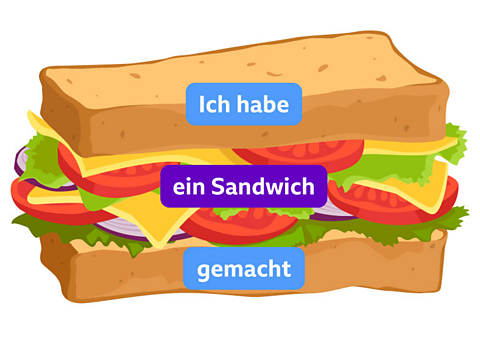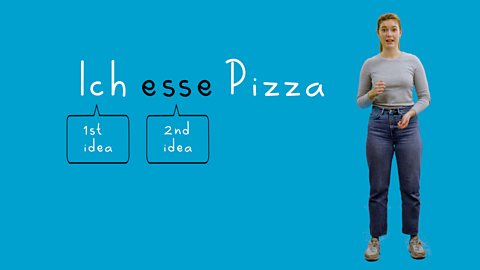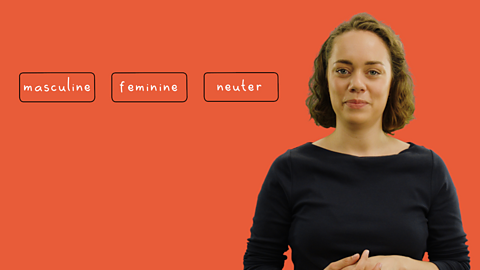To talk about things you’ve done in the past, whether it was yesterday, last week, or last year, you will need to use a past tense. In German, you can use the perfect tense. This also exists in English to show that you have done something:
- I have eaten a salad.
- He has played football.
The perfect tense: How to talk about the past in German
If you want to talk about what has happened in the past you’re going to need the perfect tense.
To form the perfect tense you need two verbs.
The first is often haben - to have - and you’re going to need the right part, such as ich habe - ‘I have’.
And the second is the past participle, such as gespielt.
Ich habe gespielt.
Ich habe Tischtennis gespielt - I have played table tennis .
To form the past participle for regular verbs you’re going to take the -en off the end of the infinitive, replace it with a -t and put ge- in front.
So spielen - gespielt.
Ich habe mit meinem Hund gespielt - I have played with my dog.
Now what about some other common verbs?
The past participle for machen - ‘to make’ or ‘to do’ - is gemacht.
Ich habe das Mittagessen gemacht - I have made lunch.
Not all verbs are regular.
The past participle for essen - ‘to eat’ - is gegessen.
Ich habe ein Brot gegessen - I have eaten a sandwich.
But some verbs don’t use haben to form the perfect tense, they use sein - ‘to be’ - instead.
The verbs that take sein all have to do with movement, so for example gehen - ‘to go’. The past participle for gehen is gegangen.
Ich bin zum Strand gegangen - I went to the beach.
With the right part of haben or sein, plus the past participle, you’ll be talking about what you did in the past in no time.
How to form the perfect tense
To form the perfect tense, you need three parts:
1. A subject
The subject is the person or thing who does the verb. This will be a noun or a pronoun such as ich (I), du (you) or er/sie/es (he/she/it).
2. An auxiliary verb
This is either haben (to have) or sein (to be). Along with the pronoun, a conjugated auxiliary verb helps you determine who is doing the action in the past.
3. A past participle
This tells you what action is happening in the past, like played or listened. Regular German past participles start with ge and end with t - gespielt (played).

The auxiliary verb 'haben'
Most German verbs in the perfect tense need the auxiliary verb haben. Use the subject and the conjugations of haben in the present tense to show who is doing the action in the past. You can find these in the table below.
| English | German |
|---|---|
| I have | ich habe |
| you have | du hast |
| he has | er hat |
| she has | sie hat |
| it has | es hat |

Conjugate means changing the endings of a verb to match the person doing the action.
The conjugation of haben has to be the second idea in the sentence.
- Ich habe Fußball gespielt - I played football.
- Du hast in London gewohnt - You lived in London.
- Er hat Hausaufgaben gemacht - He did homework.
The auxiliary verb 'sein'
If a verb implies movement, like gehen (to go) and fahren (to go/travel), it needs to use sein as an auxiliary verb instead of haben. Use the subject and the conjugations of sein in the present tense to show who is doing the action in the past. You can find these in the table below.
| English | German |
|---|---|
| I am | ich bin |
| you are | du bist |
| he is | er ist |
| she is | sie ist |
| it is | es ist |
The conjugation of sein has to be the second idea in the sentence.
Two common verbs that take sein are gehen and fahren. The past participles are irregular.
- Ich bin ins Kino gegangen - I went to the cinema.
- Du bist zum Skatepark gegangen - You went to the skate park.
- Er ist nach Deutschland gefahren - He travelled to Germany.
Past participles
Regular German past participles start with ge and end with -t, like gespielt.
To form a regular past participle:
1. Take the -en off an infinitive, leaving a stem.
2. Add ge- to the start of the stem.
3. Add a -t to the end.

Take a look at some examples of common verbs and their past participles in the table below.
| Infinitive | Past participle | English |
|---|---|---|
| spielen | gespielt | played |
| hören | gehört | listened |
| machen | gemacht | done/made |
| wohnen | gewohnt | lived |
| haben | gehabt | had |
The past participle comes at the end of the sentence.
- Ich habe Fußball gespielt - I played football.
- Du hast in London gewohnt - You lived in London.
- Er hat Hausaufgaben gemacht - He did homework.
Irregular past participles
Some past participles are irregular and don’t follow this pattern. You can find some examples in the table below. There isn’t a rule here, so try to learn the past participle when you learn a new verb. There are some examples of common irregular past participles in the table below.
| Infinitive | Past participle | English |
|---|---|---|
| essen | gegessen | ate |
| trinken | getrunken | drank |
| lesen | gelesen | read |
| sehen | gesehen | saw |
| gehen | gegangen | went |
| fahren | gefahren | went/travelled |
- Ich habe einen Apfel gegessen - I ate an apple.
- Du hast Wasser getrunken - You drank water.
- Meine Schwester hat einen Film gesehen - My sister saw a film.

Word order in the perfect tense
The verb has to be thesecond idea in all German sentences. When using the perfect tense, the auxiliary verb is the second idea and the past participle is moved to the end of the sentence.
Any extra information you want to add to the sentence is sandwiched in the middle of the two verbs:
Ich habe Fußball gespielt - I (have) played football. (translated literally as I (have) football played).
You can think about this like a sandwich. The pronoun and auxiliary verb make up the top slice of bread, the detail is the filling, and the past participle is the bottom slice of bread!

Quiz
Find out how much you know about the German perfect tense in this short quiz!
Complete the following phrases using your knowledge of the perfect tense. Use the English translations to help you.
GCSE exam dates 2025
Find out everything you need to know about the 2025 GCSE exams including dates, timetables and changes to exams to get your revision in shape.

More on Grammar
Find out more by working through a topic
- count7 of 8

- count8 of 8

- count1 of 8
